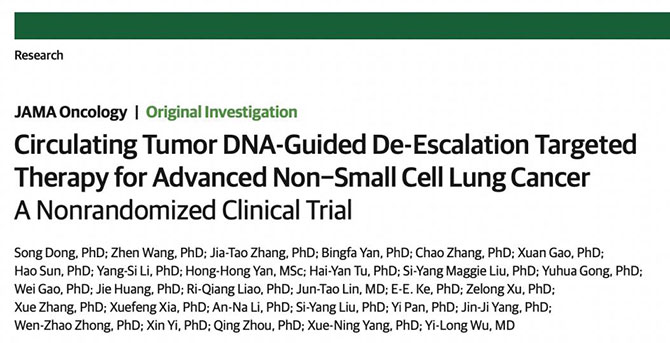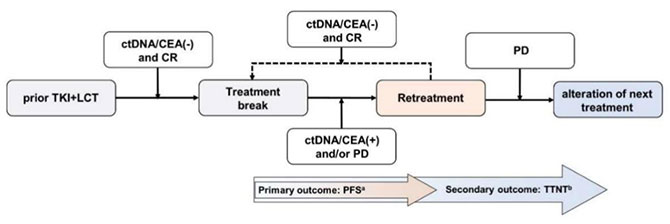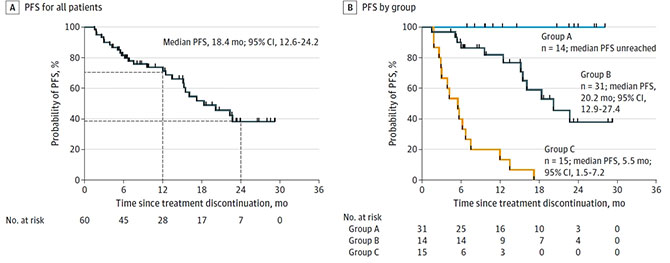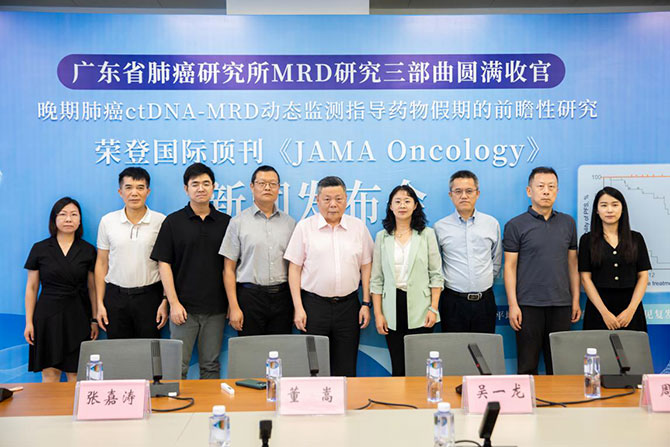

With the development of circulating tumor DNA (ctDNA) testing technology, the concept of Minimal Residual Disease (MRD) has emerged. Previous research by Guangdong Lung Cancer Institute has confirmed that for early-stage lung cancer patients after surgery and mid-stage lung cancer patients after chemotherapy and radiotherapy, if MRD is negative post-treatment, the risk of recurrence is lower. While MRD is generally less applicable in advanced lung cancer, for some advanced cases where targeted therapy has eliminated most lesions and residual lesions have been treated with surgery or radiotherapy, a state of Complete Reponse (CR) can be achieved, meaning no visible lesions are detectable on imaging. The Lung Cancer Institute team conducted a study on such cases, exploring an adaptive reduction in targeted drug therapy based on ctDNA testing: For patients with no visible lesions and negative results for tumor genes and markers in peripheral blood, targeted therapy could be temporarily suspended. If new lesions appeared or relevant indicators became positive again, targeted therapy would be resumed. Essentially, this approach offers patients a period during which they do not need to take medication, referred to as a “drug holiday.”

On the evening of June 12, 2024, this research was published online by the world-renowned medical journal JAMA Oncology. This prospective clinical study is the first to confirm the feasibility of adaptive de-escalation therapy for advanced lung cancer patients. The study challenges the traditional approach of continuous long-term use of targeted drugs in advanced patients, pointing to a new direction for optimizing individualized treatment for advanced lung cancer. This study also marks another significant achievement of Prof. Wu Yilong’s team in applying ctDNA-MRD monitoring throughout the management of lung cancer treatment, completing the Guangdong Lung Cancer Institute’s MRD research trilogy (2022 Cancer Discovery; 2023 Cancer Cell; 2024 JAMA Oncology).
The study enrolled patients with stage III/IV lung cancer who, after systemic targeted and local therapy, achieved a CR state with no active lesions detectable throughout the body, negative tumor markers, and negative ctDNA-MRD in peripheral blood. These patients then entered the “drug holiday” phase, where targeted therapy was halted. During regular follow-ups, if abnormalities were detected, the therapy was resumed, and if the indicators returned to complete negativity, the drug could be stopped again, following this cyclic strategy.

After a median follow-up of 19.2 months, the overall population achieved a median progression-free survival (PFS) of 18.4 months, equivalent to the duration of targeted drug use for advanced lung cancer patients, significantly reducing the treatment burden and side effects for patients. As of November 2022, nearly a quarter (14 cases) of the 60 patients were still in a sustained drug-free state, with a median drug-free time of 20.3 months. In this study, 24 patients experienced disease progression, but after resuming treatment, the overall response rate was as high as 96%, indicating that the drug holiday did not lead to resistance to the targeted therapy.

This study is the first of its kind globally to explore adaptive de-escalation therapy guided by ctDNA in the field of solid tumors, showing promising prospects. With the increasing number of treatment options for cancers, the mainstream approach to extending patient survival has traditionally focused on combining therapies, intensifying treatment, and pursuing long-term “addition” strategies. This study suggests that high-intensity anti-tumor therapy may more quickly induce resistance from the perspective of tumor cell evolution and evasion mechanisms. However, in current clinical practice, choosing to do “subtraction” by intentionally reducing treatment for patients, especially advising an advanced lung cancer patient to stop their medication, often requires a deeper understanding of tumor growth patterns and greater courage.

Under the leadership of Prof. Wu Yilong, Guangdong Lung Cancer Institute has long adhered to the concept of multidisciplinary comprehensive treatment. This original research result is also the fruit of collaborative clinical practice and brainstorming among the Department of Pulmonary Oncology, Pulmonary Surgery, and Radiotherapy. Some advanced lung cancer patients not only had the opportunity for surgical treatment but could also pause systemic anti-tumor treatment, similar to early-stage cases.
It is expected that after the formal publication of this research report, more patients and specialists will pay attention to and adopt this model, which will also help promote in-depth exploration of the “drug holiday” concept in a broader range of cancer treatments. Dr. Dong Song, Associate Chief Physician of the Department of Pulmonary Surgery, Dr. Wang Zhen, Chief of the Department of Pulmonary Oncology, and Dr. Zhang Jiatao, Department of Pulmonary Surgery are the co-first authors of this study. Prof. Wu Yilong and Dr. Yang Xuening, Chief of the Department of Pulmonary Surgery are the corresponding authors.
Dong Song, Zhang Jiatao
Updated: June 19, 2024